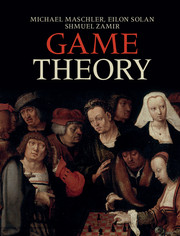Book contents
- Frontmatter
- Contents
- Acknowledgments
- Notations
- Introduction
- 1 The game of chess
- 2 Utility theory
- 3 Extensive-form games
- 4 Strategic-form games
- 5 Mixed strategies
- 6 Behavior strategies and Kuhn's Theorem
- 7 Equilibrium refinements
- 8 Correlated equilibria
- 9 Games with incomplete information and common priors
- 10 Games with incomplete information: the general model
- 11 The universal belief space
- 12 Auctions
- 13 Repeated games
- 14 Repeated games with vector payoffs
- 15 Bargaining games
- 16 Coalitional games with transferable utility
- 17 The core
- 18 The Shapley value
- 19 The bargaining set
- 20 The nucleolus
- 21 Social choice
- 22 Stable matching
- 23 Appendices
- References
- Index
5 - Mixed strategies
- Frontmatter
- Contents
- Acknowledgments
- Notations
- Introduction
- 1 The game of chess
- 2 Utility theory
- 3 Extensive-form games
- 4 Strategic-form games
- 5 Mixed strategies
- 6 Behavior strategies and Kuhn's Theorem
- 7 Equilibrium refinements
- 8 Correlated equilibria
- 9 Games with incomplete information and common priors
- 10 Games with incomplete information: the general model
- 11 The universal belief space
- 12 Auctions
- 13 Repeated games
- 14 Repeated games with vector payoffs
- 15 Bargaining games
- 16 Coalitional games with transferable utility
- 17 The core
- 18 The Shapley value
- 19 The bargaining set
- 20 The nucleolus
- 21 Social choice
- 22 Stable matching
- 23 Appendices
- References
- Index
Summary
Chapter summary
Given a game in strategic form we extend the strategy set of a player to the set of all probability distributions over his strategies. The elements of the new set are called mixed strategies, while the elements of the original strategy set are called pure strategies. Thus, a mixed strategy is a probability distribution over pure strategies. For a strategic-form game with finitely many pure strategies for each player we define the mixed extension of the game, which is a game in strategic form in which the set of strategies of each player is his set of mixed strategies, and his payoff function is the multilinear extension of his payoff function in the original game.
The main result of the chapter is the Nash Theorem, which is one of the milestones of game theory. It states that the mixed extension always has a Nash equilibrium; that is, a Nash equilibrium in mixed strategies exists in every strategic-form game in which all players have finitely many pure strategies. We prove the theorem and provide ways to compute equilibria in special classes of games, although the problem of computing Nash equilibrium in general games is computationally hard.
We generalize the Nash Theorem to mixed extensions in which the set of strategies of each player is not the whole set of mixed strategies, but rather a polytope subset of this set.
- Type
- Chapter
- Information
- Game Theory , pp. 144 - 218Publisher: Cambridge University PressPrint publication year: 2013



